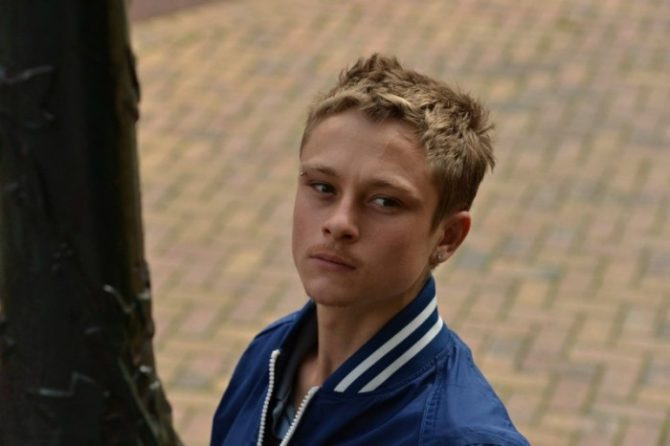Film Reviews: La Tête Haute (Standing Tall)

[Editor’s note: Cohen Media Group acquired all U.S. distribution rights for Standing Tall, which was the opening night selection for the 2015 Cannes Film Festival.]
Just as America is experiencing its racial moment with films like Selma, France is having a social moment at a time of high unemployment and EU tensions. The Vincent Lindon vehicle, The Measure of a Man, took a harsh look at corporate ethics. And now La Tête Haute (Standing Tall), which opened the Cannes festival and is only the third feature directed by the talented actress Emmanuelle Bercot, gives an epic portrait of a boy lost in the social welfare system. Ironically, given the title, which literally means “head held high,” Malony (played by Rod Paraudot), keeps his head bent low much of the time. When he raises it, it’s often to scream in rage or let loose a flurry of obscenities.
The film is long at two hours, but we don’t mind this too much, because we realize that that’s the point. Malony finally matures, but only after years, during which several adults do their best to help him, especially a juvenile court judge and a social worker. The accumulation of experience gives the film its heft, as well as its impact when Malony begins to improve.
One minor problem with the film has to do with aging and the years covered. Catherine Deneuve as the judge, despite her powerful presence, seems a bit old for the part. Sara Forestier, as the mother, seems too young, though we know that very young mothers are a fact of life. Malony himself always seems like a 14-year-old, though he is supposed to be younger at the beginning and older at the end.
The film strongly resembles the French-Canadian Mommy: the same out-of-control adolescent boy, the same feckless mother, the same near-incestuous relationship. The young boy in Mommy seemed excessive in every way, while Malony is more one-dimensional—always angry at the world, or whatever’s in front of him. Paraudot’s performance seems to have come from a close study of Vincent Cassel in La Haine, the ’80s classic of the film social. La Tête Haute also resembles Suzanne, another story of a lost child lurching from crisis to crisis, but it too had more than one register. La Tête Haute is more limited in range, which it compensates for with sheer doggedness.
The trio of adults overseeing Malony’s progress (with not much success) makes us think of innumerable films about troubled youth and juvenile delinquents going back to the James Dean films of the 1950s. But here the characters are full-bodied people who come near to cracking under stress or otherwise give vent to their own weaknesses.
Catherine Deneuve gives a compassionate, exasperated performance as judge Florence Blacque, who takes Malony’s fate in her hands. She maintains a steely control, but her concern is palpable. Benoît Magimel as Yann, a social worker who serves as a counsellor for Malony, is reminiscent of Michael Parks, the ’70s actor who specialized in hip but sensitive and well-meaning heroes. His earnestness can get drippy, but his sincerity is never in doubt (especially in the scene where he finally loses patience with Malony). Sara Forestier (who starred in Suzanne) as Malony’s mother, is either pathetically clueless or infuriatingly self-centered. Forestier almost steals the show, though she puts too much emphasis on the character’s physical tics.
As in other such films, there’s a love interest: Tess (Diane Rouxel), the daughter of one of the counsellor at a juvenile home. She gives a vivid portrayal of a tomboyish, independent-minded girl, but her motivations aren’t always clear. After she becomes pregnant, her reactions don’t seem convincing, except as a narrative gimmick. Eventually she all but disappears from the film, even as her baby has a salutary effect on Malony.
The movie takes place in Dunkirk, but we don’t really see much of the city or its environs. Malony (and the audience) spends most his time in a universe of courtrooms, juvenile homes, jails, hospitals. The only edifying scenery, a counterweight to the heaviness of the protagonist’s travails, is at a rural boys camp he is sent to, where he gets humanized (and where he meets Tess).
The fact that the countrified institution (reminiscent of Boys Town) is the one genuinely positive setting points out the paradox of the movie. Though the casual viewer might think of it as liberal-minded (in the American sense) with its progressive reformers, its values are in a sense very conservative. The camp setting is in the idealized provincial landscape the French call la terroir which embodies traditional values. The judicial and social officials aren’t just do-gooders but paternalistic and maternalistic authority figures. And in the end, Malony finds redemption with his girlfriend and their baby. This is the same paradox that we find in French society and politics today. While Ms. Bercot sometimes seems to direct by the numbers, and relies too much on in-your-face sensationalism, La Tête Haute gives a very direct look at the dysfunctional side of contemporary French society, and at least sees a way out—though only after a very long wait.
Production: Les Films du Kiosque/France 2 Cinéma/Wild Bunch
Distribution: Wild Bunch
Dimitri Keramitas is director at the Paris Alumni Network (PAN) a professional organization of several hundred persons, and editor-in-chief of Panache, the PAN newsletter. He is also director of the creative writing program at WICE, and associate director of the Paris Writers Workshop.
Share to: Facebook Twitter LinkedIn Email
More in film review
Leave a reply
Your email address will not be published. Required fields are marked *



